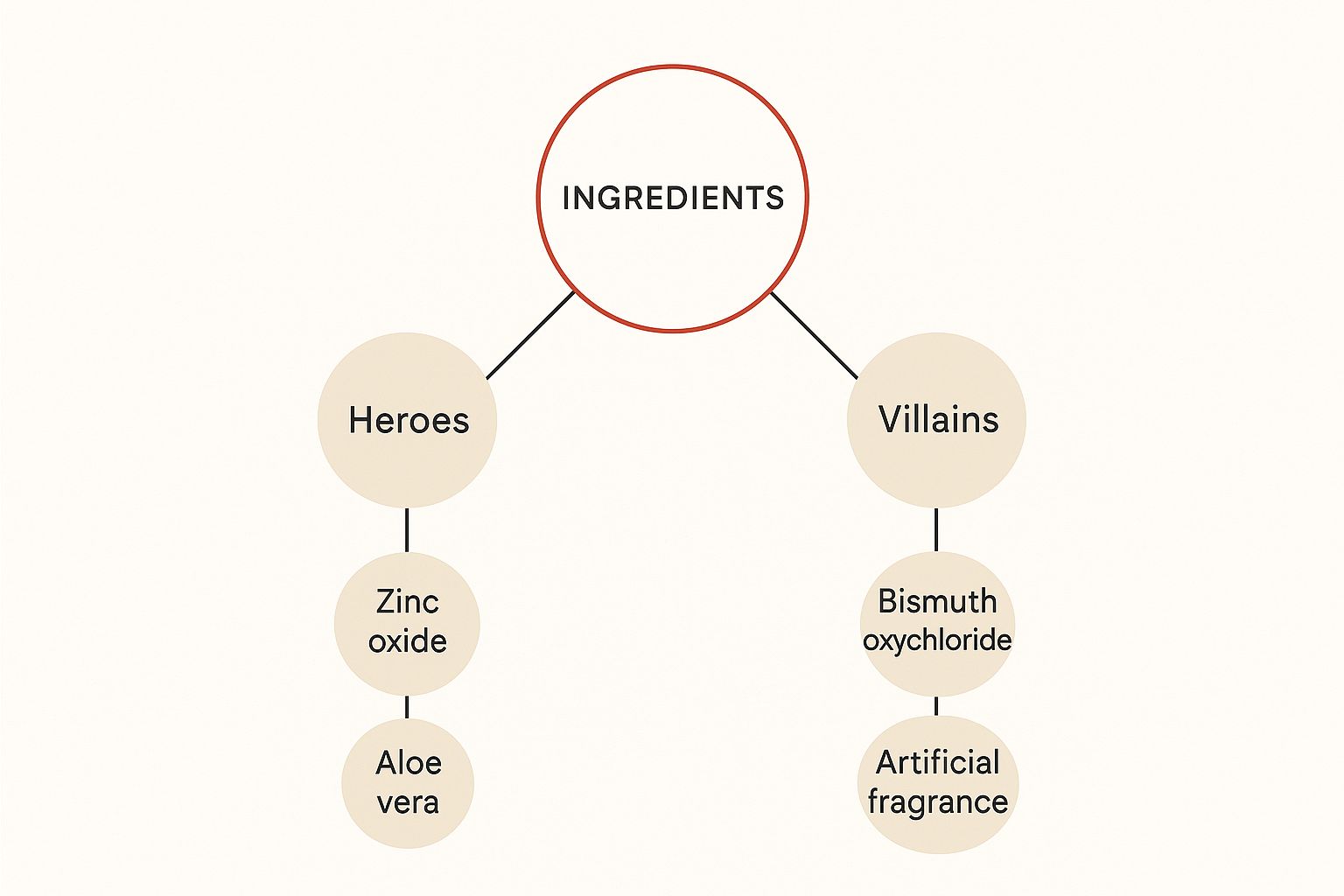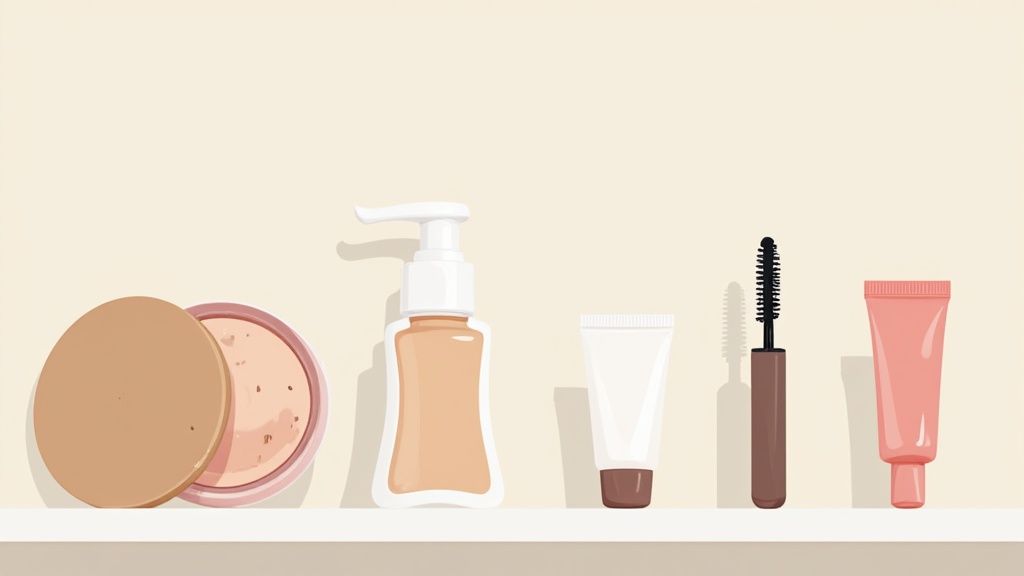When it comes to the best natural makeup for sensitive skin, the game plan is simple: look for mineral-based formulas packed with minimal, calming ingredients. Your best friends are brands that shout about being fragrance-free, non-comedogenic, and dermatologist-tested. Sticking to these will be your ticket to avoiding that dreaded redness and irritation.
Your Guide to Calm and Confident Skin

Let's be real: shopping for makeup with sensitive skin can feel like walking through a minefield. One wrong move—one sneaky ingredient—and you’re dealing with redness, itching, or a breakout you didn't ask for. It’s a frustrating cycle that can make you wonder if looking good has to mean feeling miserable.
But here’s the good news: you don't have to choose between happy skin and wearing makeup you love. The world of natural cosmetics has stepped up in a big way, offering gentle, plant-derived, and mineral-based goodies that actually work with your skin, not against it.
Why Natural Makeup Is Gaining Momentum
This move toward kinder formulas isn't just some passing trend; it’s a full-blown shift in how we think about what we put on our skin. More and more of us are demanding products that put health first, and the market is exploding because of it.
The global market for sensitive skin care products (makeup included) hit a massive USD 146.94 billion in 2024. It’s expected to climb to nearly USD 282.21 billion by 2032. What’s driving this? A huge consumer pivot toward natural and organic ingredients.
Think of this guide as your roadmap to navigating this new, exciting landscape. We’re going to pull back the curtain on ingredient labels and shine a spotlight on the calming components that will help you make choices you feel great about.
Before you even think about specific products, the first, most crucial step is truly understanding your own skin. Knowing your skin's unique quirks is the foundation for everything else. You can get a head start and learn how to Know Your Skin Type First Step To Finding The Right Natural Skincare.
Consider this your go-to resource for achieving a calm complexion with makeup you can finally, truly trust.
Why Your Skin Freaks Out About Your Makeup
To figure out which natural makeup is going to be your skin's new best friend, it helps to first understand why it gets so bent out of shape in the first place.
Picture your skin's protective outer layer, the stratum corneum, as a bouncer at a super exclusive club. For most people, this bouncer is pretty chill, letting approved guests (aka gentle ingredients) in and out without a fuss.
But if you have sensitive skin, your bouncer is on high alert. All. The. Time. This bouncer is jumpy and tends to misread the room, flagging harmless ingredients as major party fouls. When it spots something it doesn't like, it sounds the alarm, and you're left with the aftermath: redness, itching, and that all-too-familiar irritation.
This isn't just your skin being dramatic; it usually means your skin barrier is compromised. When that barrier is weak, it’s like leaving the club's side door unlocked—irritants sneak in way too easily, triggering that overeager bouncer to go into full-on panic mode.
The Usual Suspects in Conventional Makeup
Some ingredients are notorious for crashing the party and causing a scene. You'll find them all over traditional makeup formulas, and they're often the reason so many of us have bad reactions. Learning how to spot them is your first line of defense.
Here are the main offenders to keep an eye out for:
- Synthetic Fragrances: Often hiding under the vague label of "parfum" or "fragrance," this is basically a mystery cocktail of potentially hundreds of chemicals. These are one of the biggest culprits behind contact dermatitis.
- Parabens: These are preservatives, like methylparaben or propylparaben, that give products a long shelf life. For some people, especially those dealing with rosacea or eczema, they're just plain irritating.
- Sulfates (SLS/SLES): More common in cleansers, but they sometimes sneak into liquid foundations to help with texture. They're known for stripping away your skin's natural oils, which only makes a weak barrier even weaker.
- Harsh Chemical Sunscreens: Ingredients like oxybenzone and avobenzone absorb UV light and turn it into heat. For sensitive and rosacea-prone skin, this chemical reaction can be a major trigger.
- Certain Alcohols: Not all alcohols are created equal, but the drying kinds like SD alcohol or denatured alcohol can suck the life out of your skin, leaving it feeling tight and irritated.
Getting a handle on these triggers is honestly the most powerful thing you can do. It takes you from randomly guessing which products might work to knowing exactly what to avoid. Suddenly, you're the one in control.
Once you know which ingredients are messing with your skin's delicate balance, you can start making way smarter choices. This is the foundation (pun intended) for finding natural makeup that actually supports and soothes your skin instead of constantly challenging it. The goal is to find formulas that work with your skin’s bouncer, not against it.
How to Read Natural Makeup Labels
Staring at an ingredient list can feel like you’re trying to decode a secret message. It's a jumble of scientific-sounding words that can be totally intimidating. But here’s the thing—once you know a few key players, you’ll be a pro at spotting what your sensitive skin will love and what will send it running for the hills.
Think of it like being a detective for your own face. The best natural makeup for sensitive skin isn't about fancy marketing claims; it’s all about what's actually in the product. Learning to read that label is your single most powerful tool.
We’re going to break it down into two simple camps: the heroes you want on your team, and the villains you need to kick to the curb.
The Heroes to Look For
These are the good guys—the calming, soothing, and hydrating ingredients that are the foundation of great makeup for sensitive skin. When you see these pop up near the top of an ingredient list, you know you're on the right track.
- Mineral Pigments: Say hello to your new best friends: zinc oxide and titanium dioxide. Not only do they provide gorgeous color and coverage, but they also have natural anti-inflammatory properties that help calm down redness.
- Botanical Extracts: Think of these as nature’s peacemakers for your skin. Ingredients like chamomile, aloe vera, calendula, and green tea extract are rockstars at soothing irritation and reducing inflammation.
- Gentle Hydrators: Happy skin is hydrated skin. Simple as that. Squalane, glycerin, and hyaluronic acid are amazing because they deliver moisture without clogging pores or triggering a reaction.
It’s not just us saying it, either. A 2024 survey showed that 56% of consumers now prefer cream and lotion makeup formulations, which are often packed with these kinds of gentle hydrators. That superstar ingredient, hyaluronic acid, is so loved that its global market is projected to hit a whopping USD 14 billion by 2032.
This visual sums up the whole good vs. bad ingredient concept perfectly.

The biggest takeaway? Keep it simple. If you can learn to recognize a handful of skin-loving ingredients and the main troublemakers, reading labels becomes way less overwhelming.
The Villains to Avoid
Now for the ingredients to watch out for. Just because a label shouts "natural" doesn't automatically give it a free pass for sensitive skin. Let's be real, nature has its fair share of irritants, too. Some ingredients, even if they come from a plant, are known to cause chaos for reactive complexions.
Here are the usual suspects to put on your "avoid" list:
- Artificial Fragrance: This is a huge red flag. Often listed simply as "fragrance" or "parfum," it’s a blanket term that can hide dozens of potential chemical irritants. It's one of the top causes of allergic reactions in skincare and makeup.
- Certain Essential Oils: They sound so lovely, don't they? But potent oils like peppermint, lavender, and citrus oils can be seriously sensitizing. They might smell incredible, but they can leave your skin red, itchy, and angry.
- Bismuth Oxychloride: This mineral is used a lot in powder foundations to create that shimmery, pearlescent glow. The problem is its crystalline structure can wedge itself into pores, leading to irritation and even cystic acne for some people.
Ready for a quick reference? This little cheat sheet can help you remember the key players when you're shopping.
Sensitive Skin Ingredient Cheat Sheet
| Ingredient Category | Look For (The Heroes) | Avoid (Potential Villains) |
|---|---|---|
| Pigments & Powders | Zinc Oxide, Titanium Dioxide, Iron Oxides, Mica | Bismuth Oxychloride, Talc (can be contaminated) |
| Soothing Botanicals | Aloe Vera, Chamomile, Calendula, Green Tea Extract | Peppermint Oil, Lavender Oil, Citrus Oils, Witch Hazel |
| Moisturizers | Squalane, Glycerin, Hyaluronic Acid, Jojoba Oil | Mineral Oil, Lanolin (can be an allergen for some) |
| Additives | Vitamin E (Tocopherol), Natural Preservatives | Artificial Fragrance/Parfum, Synthetic Dyes, Harsh Alcohols |
Remembering this handful of ingredients can make a massive difference in keeping your skin calm and happy.
The most important rule of thumb is to be skeptical of vague marketing terms. Words like "clean," "green," and even "hypoallergenic" aren't regulated by any official body. Your best defense is always to flip the product over and read that ingredient list for yourself.
Opting for fragrance-free beauty products is one of the easiest and most impactful changes you can make. By ditching both synthetic perfumes and potentially irritating essential oils, you dramatically lower your risk of a bad reaction.
Finding the Right Natural Makeup Products

Alright, you’ve learned how to spot the heroes and villains on an ingredient list. Now it's time to put that detective work into action. Choosing the best natural makeup for sensitive skin isn’t about finding one single miracle brand, but about understanding which product types will soothe your skin and which will just tick it off.
And you’re not alone in this. The move toward ingredient-conscious beauty is a full-blown movement. The natural cosmetics market is expected to jump from USD 52.4 billion in 2025 to a whopping USD 95.7 billion by 2035. That’s a whole lot of people demanding cleaner, gentler formulas.
Foundations and Concealers Your Skin Will Love
Let's start with your base, since it covers the most real estate on your face. Getting this part right is critical, and you’ve basically got two amazing options.
Mineral Powders: These are pretty much the holy grail for anyone with sensitive, acne-prone, or rosacea-flushed skin. Made from finely milled minerals like zinc oxide and titanium dioxide, they give you buildable coverage while actually helping to calm inflammation. Think of it less like a heavy mask and more like a breathable, protective shield.
Calming Liquid Formulas: If you’re more of a dewy-finish person, hunt down liquid foundations and concealers that use soothing ingredients like aloe vera or squalane as their base. The real trick is finding formulas that are water-based and silicone-free, so they won’t trap bacteria or clog your pores.
Quick tip: No matter what you choose, look for the term "non-comedogenic" on the label. It’s just a fancy way of saying the product was formulated so it won’t cause breakouts—a total must-have for reactive skin.
You can dive deeper into choosing the right base and other products in our guide to hypoallergenic makeup for sensitive skin.
Blushes and Bronzers for a Healthy Glow
Adding a pop of color to your cheeks shouldn’t come with a side of irritation. When you’re shopping for blushes and bronzers, the texture and what’s inside make all the difference.
- Talc-Free Powders: So many traditional pressed powders use talc, which can be super drying and sometimes contaminated with other irritants. Look for powders that use gentler alternatives like mica, cornstarch, or rice powder for a smooth, seamless blend.
- Minimalist Cream Formulas: Cream blushes are fantastic for sensitive skin, especially if you’re on the drier side. They often contain nourishing oils and butters that hydrate while giving you a natural flush. The best ones have simple, recognizable ingredient lists—think five or six ingredients, max.
Eye Makeup That Won’t Cause Irritation
The skin around your eyes is incredibly delicate, making it ground zero for reactions. Gentle eye makeup is non-negotiable.
Mascaras: Find formulas without the usual suspects like synthetic dyes, parabens, and fragrance. Lots of natural mascaras use conditioning ingredients like jojoba oil or beeswax to nourish your lashes while they lengthen and volumize.
Eyeliners: Your best bet is a soft pencil that doesn’t require you to tug at your lash line. Look for pencils made with natural waxes and mineral pigments to avoid that dreaded watering, itching, or redness.
Application and Removal Techniques That Protect Your Skin

Choosing the right natural makeup is a huge win for sensitive skin, but that’s really only half the story. How you put your makeup on and take it off is just as crucial for keeping irritation at bay.
Think of your skin like a delicate piece of silk. You wouldn't scrub it with a harsh brush, right? Aggressive tugging and rough products will just fray the fabric, but a gentle touch keeps it smooth and happy.
The first step is always creating a calm canvas. That means applying makeup to clean, well-moisturized skin. A hydrated base doesn't just help makeup glide on smoothly; it also reinforces your skin’s protective barrier, making it way less likely to get angry during the day.
The Gentle Application Process
Your application tools can either be your skin's best friend or its worst enemy. Stiff, scratchy brushes or abrasive sponges can create tiny micro-tears in the skin, leading to redness and inflammation. Nope, thank you.
For the best results, stick to softer, kinder methods:
- Soft, Synthetic Brushes: These are less porous than natural hair brushes, which means they don't harbor as much bacteria and are a breeze to clean—a major plus for reactive skin.
- Your Fingertips: Never underestimate the power of your own hands! The warmth from your fingers helps melt products like cream blush or foundation right into your skin for a seamless, natural finish, all without any pulling.
Sponges can work, but they also tend to soak up product and can become a breeding ground for bacteria if you're not careful. If you love your sponge, knowing the right way to use it is key. Our guide on how to apply foundation with a sponge has some great tips for a gentle, flawless finish.
Before you go all-in with a new product, the most important step is the patch test. Seriously, don't skip this. Apply a small amount to a discreet spot, like your inner arm or behind your ear, and wait 24-48 hours to make sure there’s no reaction.
Smart and Soothing Removal
At the end of the day, getting your makeup off gently is completely non-negotiable. Harsh makeup wipes are a common culprit for irritation. They often require a lot of rubbing and are loaded with drying alcohols and fragrances. It’s time to ditch the wipes for good.
A much better approach? The double-cleansing method.
Start with an oil-based cleanser or even pure jojoba oil to dissolve makeup, sunscreen, and grime without stripping your skin. Then, follow up with a creamy, hydrating, water-based cleanser to wash everything away. Your skin will be left clean, soft, and totally calm. This simple two-step process ensures a thorough cleanse while minimizing stress on your delicate complexion.
Your Path to Healthy Skin and Beautiful Makeup
Let's pull this all together, shall we? Finding the best natural makeup for sensitive skin and getting that beautiful look you're after is totally doable. The trick is to really get to know your ingredients and, most importantly, listen to what your own body is telling you.
Think of it as becoming your own skin's advocate—you can now spot your personal triggers from a mile away and read an ingredient label like a seasoned pro.
You've got the know-how to pick out calming, gentle products and build routines that work with your skin, not against it. It's about curating a makeup bag that not only makes you look good but actually helps keep your skin happy and healthy.
This isn't about limiting yourself. It's about freedom—the freedom to play with makeup without worrying about that dreaded itch, flare-up, or breakout. It’s about feeling radiant and comfortable, every single day.
When you start making these thoughtful choices, your relationship with makeup can finally shift from one of stress to one of pure joy. Go on and enjoy the confidence that comes from knowing exactly what you're putting on your face.
Your Questions, Answered
Jumping into the world of natural makeup when you have sensitive skin can feel a little daunting. We get it. Let’s clear up some of the most common questions so you can feel totally confident about what you’re putting on your skin.
Is “Hypoallergenic” Makeup a Magic Bullet?
Not exactly. While the term "hypoallergenic" sounds reassuring, it’s not actually a legally regulated claim. This means there’s no official standard a brand has to meet to slap that label on its packaging.
Think of it more like a friendly suggestion than a concrete guarantee. Some products labeled hypoallergenic can still hide potential troublemakers like synthetic fragrances or preservatives. The best move? Always ignore the marketing hype on the front and flip the product over to scan the full ingredient list yourself.
Can I Wear Makeup if I Have Rosacea or Eczema?
Yes, you absolutely can—it just requires being a bit more selective. The first and most important step is to have a quick chat with your dermatologist. They know your skin best and can give you advice tailored to your specific triggers.
That said, many people with rosacea and eczema do really well with minimalist, mineral-based makeup. The key is finding formulas that are totally free of fragrance, alcohol, and other harsh chemicals. Ingredients like zinc oxide can be a game-changer; it has natural anti-inflammatory properties that help soothe redness and calm down irritation, making it a superstar ingredient in the best natural makeup for sensitive skin.
What's the Right Way to Patch Test New Makeup?
Patch testing is non-negotiable! It’s the single most important thing you can do before welcoming a new product into your routine. It’s a super simple safety check to see how your skin will react before you commit to a full-face application.
Here’s how to do it right:
- Pick a Low-Key Spot: Dab a tiny amount of the product somewhere discreet, like the inside of your arm, behind your ear, or along your jawline.
- Wait it Out: Leave the product on for at least 24 to 48 hours. Try not to wash or disturb the area during this time.
- Look for Clues: After a day or two, take a close look at the spot. See any redness, itching, swelling, or little bumps? If the coast is clear and your skin looks totally normal, you’re good to go!
Ready to build a makeup routine that loves your skin back? Discover gentle, vegan, and plastic-free options at Axiology. Explore our collection and find your perfect match.





